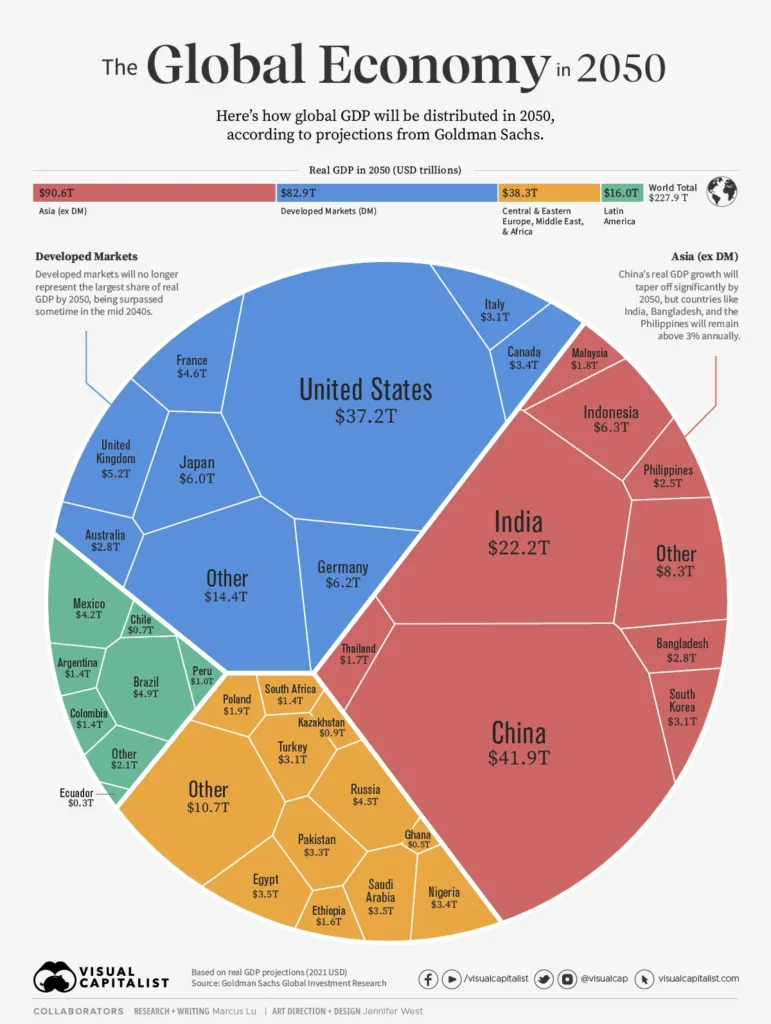The Future of Global Trade: How Emerging Markets Are Shaping the Economy is a topic of great interest and importance in today’s interconnected world. As the global economy continues to evolve, emerging markets play a crucial role in shaping the future of trade and commerce. These markets, which include countries like China, India, Brazil, and others, are becoming increasingly influential in driving international trade and investment. This shift is reshaping traditional economic power dynamics and creating new opportunities for growth and development.
In addition to the traditional economic powerhouses, emerging markets such as Vietnam, Indonesia, and Mexico are also gaining attention for their significant contributions to global trade. These countries are not only driving economic growth within their own borders but also playing a key role in shaping the global economy. Their expanding consumer markets, growing middle class, and strategic geographic locations make them important players in the future of global trade. As these emerging markets continue to develop and integrate into the global economy, they are poised to have a significant impact on the future of trade and commerce.
The Rise of Emerging Markets in Global Trade
Emerging markets have been playing an increasingly significant role in the global economy, particularly in the realm of international trade. These markets, which include countries such as China, India, Brazil, and South Africa, have experienced rapid industrialization and economic growth in recent decades, leading to their emergence as major players in global trade. As these economies continue to expand and modernize, they are becoming increasingly integrated into the global trading system, influencing the dynamics of international commerce.
One of the key factors driving the rise of emerging markets in global trade is their abundant labor supply and lower production costs compared to developed economies. This has made them attractive manufacturing bases and outsourcing destinations for multinational corporations, leading to a significant increase in their export volumes. Additionally, the growing consumer markets in these economies have also contributed to their increasing importance in global trade, as they offer lucrative opportunities for foreign businesses looking to expand their customer base.
The Impact of Emerging Markets on Global Supply Chains
The emergence of emerging markets as key manufacturing hubs has had a profound impact on global supply chains. These economies have become integral parts of the production networks of many industries, supplying components, raw materials, and finished goods to companies around the world. As a result, disruptions in these emerging markets, whether due to natural disasters, political instability, or other factors, can reverberate throughout global supply chains, affecting businesses and consumers worldwide.
Furthermore, the increasing sophistication and technological capabilities of emerging market firms have led to a shift in the global division of labor, with these economies taking on more advanced manufacturing and innovation-related activities. This has implications for the competitiveness of traditional manufacturing powerhouses and has prompted companies to re-evaluate their supply chain strategies to leverage the strengths of emerging markets.
Challenges and Opportunities in Trade with Emerging Markets
While the rise of emerging markets presents significant opportunities for global trade, it also comes with its own set of challenges. One such challenge is the need to navigate the diverse regulatory environments, business practices, and cultural nuances present in these markets. Companies must adapt to the specific conditions of each emerging market to effectively engage in trade and investment activities.
On the other hand, the rapid urbanization and expansion of the middle class in many emerging markets offer immense opportunities for businesses to tap into new consumer markets. By understanding the unique preferences and purchasing behaviors of these consumer segments, companies can tailor their products and marketing strategies to effectively capture a share of these growing markets.
Technological Innovation and Emerging Markets in Global Trade
Technological innovation has been a driving force behind the integration of emerging markets into global trade. The digital revolution has enabled businesses in these markets to connect with customers and partners around the world, overcoming traditional barriers to international trade. E-commerce platforms, digital payment systems, and advanced logistics solutions have facilitated the expansion of trade activities in emerging markets, opening up new possibilities for global commerce.
Furthermore, emerging market economies have been increasingly investing in technological infrastructure and capabilities, fostering the growth of high-tech industries and knowledge-based services. This has not only enhanced their competitiveness in global trade but has also contributed to the diffusion of innovation and the exchange of expertise across borders, shaping the future of the global economy.
Sustainable Development and Trade in Emerging Markets
As emerging markets continue to play a pivotal role in global trade, the issue of sustainable development has come to the forefront of discussions. The rapid industrialization and urbanization in these economies have raised concerns about environmental degradation, resource depletion, and social inequalities. Addressing these challenges is crucial for ensuring the long-term viability of trade relations with emerging markets.
Many emerging markets are increasingly prioritizing sustainable development goals, integrating environmental and social considerations into their trade and investment policies. This has led to a growing emphasis on renewable energy, eco-friendly technologies, and socially responsible business practices, presenting opportunities for collaboration and knowledge exchange between emerging markets and their global trade partners.
| Topic | Description |
|---|---|
| Global Trade Shift | Emerging markets are playing an increasingly significant role in shaping the global economy and trade patterns. |
| Key Players | Countries such as China, India, Brazil, and South Africa are becoming major players in global trade, challenging traditional economic powers. |
| Impact on Supply Chains | Emerging markets are reshaping global supply chains, leading to new trade routes and partnerships. |
| Technology and Innovation | Emerging markets are driving technological innovation and digital transformation in global trade. |
| Challenges and Opportunities | While emerging markets offer new opportunities for growth, they also present challenges such as regulatory differences and political instability. |
conclusıon
The future of global trade is being significantly influenced by the rise of emerging markets, which are reshaping supply chains, driving innovation, and challenging traditional economic powers. While this shift presents new opportunities, it also brings about challenges that need to be navigated in order to fully harness the potential of emerging markets in shaping the global economy.




